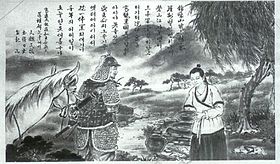Janghwa
|
Janghwa |
|
| Illustration of King Taejo and Queen Janghwa, his second wife | |
| Spelling of names | |
| Hangeul | 장화 |
| Hanja | 莊 和 |
| Revised Romanization | Janghwa |
| McCune-Reischauer | Changhwa |
| Life dates | |
| Born on the | unknown |
| place of birth | Naju , later called Baekje |
| father | Daryeon ( 다련 ) |
| Death dates | |
| Died on | unknown |
| Place of death | Songak , Goryeo |
| Spouses, mistresses, offspring | |
| husband | Taejo |
| Sons | Wang Mu ( 왕무 ) |
Janghwa ( Korean : 장화 ) (* in the 9th century in Naju , later Baekje ; † in the 10th century in Songak , Goryeo ) was queen and 2nd wife of the founder of the Goryeo dynasty ( 고려 왕조 ) (918-1392) , King Taejo ( 태조 ).
Life
Queen Janghwa was the daughter of the wealthy prince Daryeon ( 다련 ), who came from the Oh-Klan and who lived with his family in Naju ( 나주 ), in the southwest of the Korean peninsula . The story of his daughter was later told that she once dreamed that a dragon had entered her body through her belly. Some time later, General Wang Geon ( 왕건 ), the later founder of the Goryeo dynasty, anchored his ship on the coast of Mokpo ( 목포 ) and followed five colored clouds that he saw on the horizon. He found the prince's daughter doing laundry at a spring. He fell in love with her, slept with her, but through coitus interruptus prevented her from getting pregnant. But she is said to have taken the semen from him and inserted it into her vagina, so that she became pregnant. Her son later became King of the Kingdom of Goryeo under the name Hyejong .
When Wang Geon later founded the Goryeo Dynasty and the Goryeo Empire, Sinhye ( 신혜 ) first became queen of the country as his first wife. He married a total of 25 of his 29 wives, all of whom came from different parts of the country and over whom he wanted to consolidate his royal power. Three of them became queens in succession, and Janghwa became the second queen of the Goryeo Empire after Queen Sinhye, who had remained childless. Despite the unfortunate situation for her, that her husband called numerous women his own, she stood by his side and helped to ensure stable conditions at court. In 921 her son was named Crown Prince and successor of Taejo among the numerous princes .
- annotation
Another source states that Janghwa was posthumously made queen only after her death.
literature
- Lee Bae-young : Women in Korean History . Ewha Womans University Press , Seoul 2008, ISBN 978-89-7300-772-1 (English, Korean: 한국 역사 속의 여성들 . Translated by Lee Kyoung-hee).
- Peter H. Lee : From Early Times to the Sixteenth Century . In: Sourcebook of Korean Civilization . Vol. I . Columbia University Press , 1993, ISBN 978-0-231-07912-9 (English).
Individual evidence
- ↑ a b c Lee : Women in Korean History . 2008, p. 150 .
- ^ Lee : Women in Korean History . 2008, p. 151 .
- ^ PH Lee : From Early Times to the Sixteenth Century . In: Sourcebook of Korean Civilization . 1993, p. 324 .
| personal data | |
|---|---|
| SURNAME | Janghwa |
| BRIEF DESCRIPTION | Queen of the Goryeo Dynasty in Korea |
| DATE OF BIRTH | 9th century |
| PLACE OF BIRTH | Naju , Later Baekje |
| DATE OF DEATH | 10th century |
| Place of death | Songak , Goryeo |
